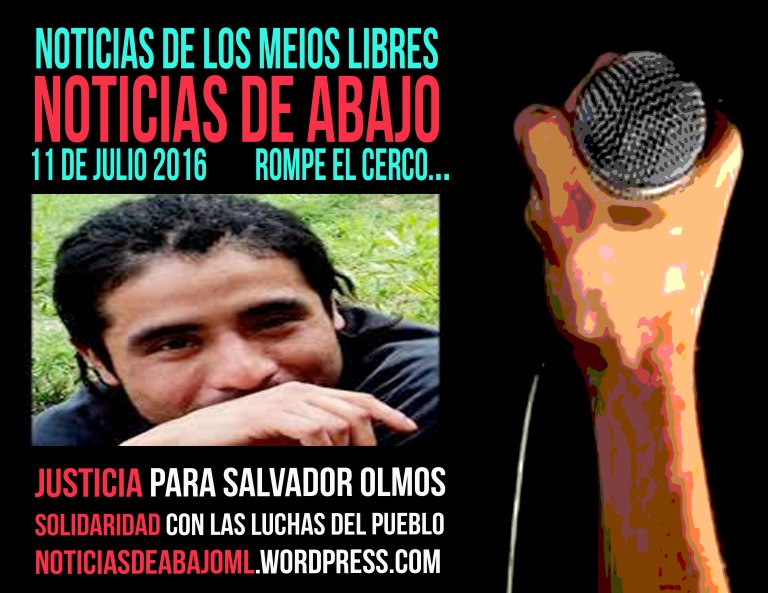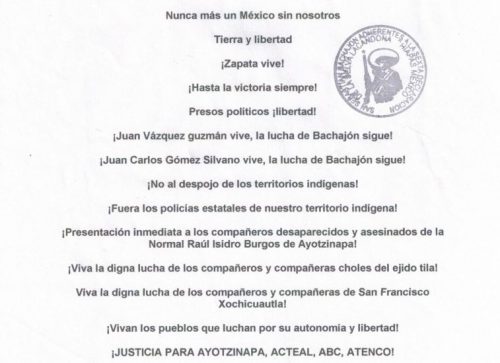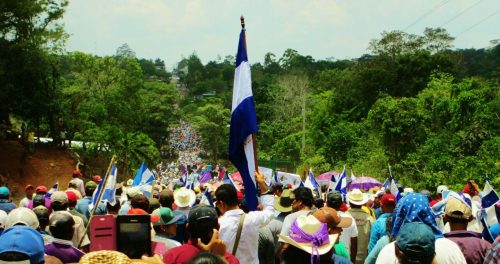
Autonomy and Resistance
(Español) Noticiero Medios Libres 11 de Julio

Este es un esfuerzo de los medios libres.
Informa, comunica, rompe el cerco…
Columna mañanera
Audios de la Transmision Radial en solidaridad con los maestros mexicanos
Rompiendo Fronteras
—Estado Español: Protestas por la visita de Obama al Estado Español. Vía Kaos en la Red.
—Estado Español: La Audiencia Nacional juzga a “César Strawberry” por alabar a ETA y los Grapo en Twitter Vía Kaos en ela Red.
–Honduras: Fue asesinada otra activista de COPINH. Vía DemocracyNow
–Estados Unidos: Crecen las Protyestas contra la racista y brutal policia en los Estados Unidos tras agresiones a afroamericanos y la balacera contra la policia en Dallas
Rebelion y Democracy Now
—Francia-Del BDS a la CGT: crónica de una criminalización a través de una política del miedo de Saïd Bouamama. Vía Rebelión
Desde el ombligo de monstruo
—México: Ataque explosivo a sedes de cámaras empresariales
Publicado por Noticias de abajo – Medios Libres
—“El EZLN nos está dando una nueva enseñanza el día de hoy”, CNTE.
Publicado por Radio Pozol
—CIDECI-Unitierra anuncia que sí habrá Festival CompArte.
Publicado por Komanilel
—CNTE termina bloqueo carretero en Comitán. La lucha magisterial entra a una nueva etapa, aseguran.
Publicado por Komanilel
—Representación de la CNTE en Morelos: «La lucha ahora es popular»
Publicado por Agencia SubVersiones
—-Oaxaca. Rechaza en la mixteca productos trasnacionales
—Chihuahua Movimiento obrero de las maquilas en pie. Vía El Pueblo
—Veracruz Audio en redes Una bala no mata sueños: Jairo Guarneros
Columna caminera
Entrevista a compañeros de Salvador Olmos del Colectivo Libertario y del grupo de punk Anonimo
(Español) Esta lucha es del pueblo de México
Oaxaca 2016: <<Esta lucha no es del magisterio, es del pueblo de México>>
Por Simón Sedillo y Niñx Salvaje; Fotos por Radio Jenjop y Estereo Comunal Yeelatoo
En Oaxaca, 12 personas han sido asesinadas por la policía entre el 19 y 26 de junio de 2016, mientras participaban en la actual rebelión que está viviendo el estado[1]. Uno de los asesinados era maestro, todos los demás eran parte del pueblo. A pesar de la violenta represión, una multitud de bloqueos siguen vigentes en todo el estado, ya sea de forma puntual o permanente. Además, miles de hombres y mujeres, niñas, niños, jóvenes, ancianos y comunidades enteras se han manifestado en apoyo al magisterio, en repudio hacia la represión y en contra de las reformas estructurales y de las políticas neoliberales que amenazan a las comunidades. En este contexto, una cosa queda clara: la lucha en Oaxaca no sólo es una lucha de maestros y maestras sino la de los pueblos que por su parte luchan también por la vida, el territorio y la autonomía. En Oaxaca, la resistencia de los pueblos no empieza ni se acaba con la del magisterio: comenzó siglos atrás y su camino todavía es largo.










